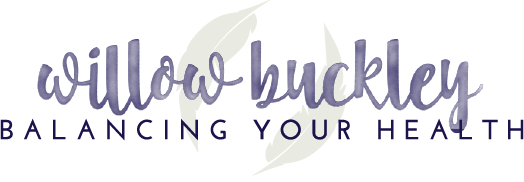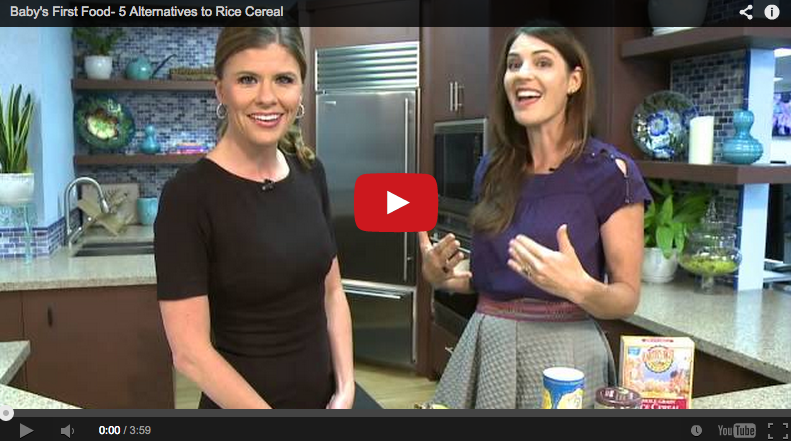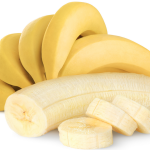You’ve either exclusively breast fed your baby for the first six months, unanimously recommended by the AMA (American Medical Association), AAP (American Academy of Pediatrics), and WHO (World Health Organization), or been feeding her formula. Either way, now your baby has popped some teeth, sitting up on her own, and is even reaching for your plate and grabbing at your fork. Although every baby is ready on their own timeline, these milestones may mean that your baby is ready for solid food. When this time comes, it has been generally unquestioned that it is time to reach for the good ole’ fashioned rice cereal. For about 60 years rice cereal has sneaked its way into being the “best choice” for a baby’s first food. What were we thinking? Thankfully, questions have been raised and it’s real value is now surfacing along with better and more intuitive alternatives for baby’s first bites- real food.
Rice Cereal: How and Why It’s a Flawed Food
-
Low protein and high carbohydrates
Most commercial cereals are refined. This means that the nutritious nutrients are taken out and what’s left is basically sugar. As Dr. Joseph Mercola states:
“…white rice is a refined carbohydrate, a group of highly processed, nutritionally devoid foods that have been linked to increased rates of heart disease, insulin resistance, eye damage and cancer in adults, and are worthless nutritionally for infants as well.”
-
Not real food
Rice cereal is processed and although fortified with iron and other nutrients, they aren’t bioavailable (AKA not able to be absorbed by the body!) Although we are told that rice cereals are fortified with iron, why are we so quick to believe that there is no other source of real food that our babies could get iron from? The iron in cereals is very hard for a baby to absorb. They only absorb about 7-8%! That is one reason why moms might find their babies constipated after starting rice cereal. Most of the iron is binding and not absorbed. The iron reserves of a baby do drop around 6 months, but Mother Nature is ready. If a mom is still supplementing with breast milk, her baby is getting iron. Even if in small amounts, breast milk contains enzymes that help with iron absorption. Again, breast milk is the perfect food. And below I’ll tell you what real foods you can give your baby that are rich in bioavailable iron.
-
Most rice cereals turn into glucose almost instantly in the baby’s mouth- that’s SUGAR
As mentioned, the big hype of baby’s first food is programming the body through praise that an appetite for sugar and refined carbohydrates is what the body needs. Because of this, rice cereal has been linked with childhood obesity and type 1 diabetes. If this isn’t enough to stop the madness of rice cereal for a first food, I don’t know what will be. Mercola continues:
“White rice — after processing strips away fiber, vitamins and other nutrients — is a ‘nutritional disaster’ … White rice and flour turn to sugar in the body ‘almost instantly,’ … raising blood sugar and insulin levels.”
-
Babies don’t have the enzymes to break down grains until around one year old
It’s supposed to be easily digestible. We have all heard of the BRAT diet after we are sick with the stomach flu, because it is bland and easy to digest. However, the Banana-Rice -Applesauce-Toast recommendation is not for infants. Babies don’t make enough of the enzymes amylase to break down grains until they are at least one year old. So it’s a myth that rice cereal is easy to digest for babies. Most grains, including rice, should be soaked for at least 2-3 hours before it’s cooked even for adults to help break it down for easier digestion.
-
It’s bland
Your baby has been enjoying flavor for a long time. First, throughout pregnancy in the womb there is the flavor of the amniotic fluid, which changes depending on the mom’s diet. And again through breast milk, which also takes on flavors depending on what mom is eating. This is why eating a wide variety of foods is recommended to breast feeding mothers. It helps introduce babies to the variety of flavors out there that they will one day be enjoying from the source.
◊Fun Fact- studies have shown that babies prefer breast milk that has a second hand flavor of garlic, occurring shortly after the mother ingests the garlic.
Parents hype up the first feeding into an almost psychological imprint with food for their baby. I did. With our first son I couldn’t wait until he fulfilled the check list. He could sit up, crawl, stand, was interested in food, and the day after he broke his first tooth I was ready for the EVENT. We sat him down, I made sure the lighting was good for pics and video and I got my avocado ready. I scraped a nice spoonful and he looked very excited so I put it in his mouth. Apparently the spoonful was a bit large and he started to choke on it and practically vomited it back out! I couldn’t believe it. This is all on video by the way. He just wanted to play with the food. He wasn’t ready. When I let him give it to himself, he was able to enjoy it, play with it, learn texture, enjoy the color and the flavor. Somehow I expected him to enthusiastically accept this spoonful we so lovingly shoved into his mouth.
The big event, it’s like Pavlov’s dog, setting the baby up with so much praise that she did a good job and ate what you gave her. So what happens when you give her high carbohydrates, that turn into glucose immediately? Studies have suggested that this sugar introduction to baby as their first food might be linked to the high incidence of childhood obesity! Training the body to crave and want a meal that is mostly sugar.
Before you get the food remember to get the camera, get the video camera, set up the high chair, and get ready for the best photo opportunity- your baby is going to eat for the very first time! There is a lot of hype around the first food. From a baby’s perspective it’s quite the fan fare. Usually the eating is followed by praise, clapping, oohing, awing, and ‘good job.’ This can set baby up for a lot of associations with eating and food, so if you were going to serve them rice cereal? Read on and see why you might want to change.
Baby’s REAL FOOD – First Foods
Avocados! 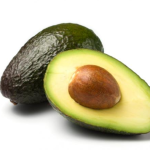
One of the best first foods. You can take it anywhere and only need a knife and spoon. You can make it whatever consistency you want by lightly scraping it into the spoon, mashing it, or cutting it into small pieces for your child to eat themselves. It’s high in vitamins and healthy fats for the skin and nervous system. Learn more about this super food here.
Egg Yolks-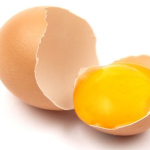
Rich in choline, healthy cholesterol, and a great source of protein. Choline which is amazing for the developing brain of your baby. You can hard boil, soft boil or lightly sauté the yolk in coconut oil. You’ll want to AVOID EGG WHITES until at least baby is one year old because these are common allergen. Use the yolks for your baby and the whites for you. The egg white actually has more protein in it than the yolk!
Sweet potatoes- 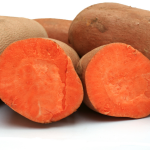
They are a super food for everyone. Sweet potatoes are a good source of iron, vitamin A, beta-caratene, and other vitamins and minerals. Increase the nutritional boost and cook them with bone broth. Or add coconut oil, ghee or grass fed butter as a brain boosting and gut boosting fat. You can steam a peeled and chopped sweet potato, boil it, or bake it. Mash it, blend it, or cut it up into small pieces. For added iron add 1/4-1/2 teaspoon of Black Strap Molasses to 1 cooked medium-large sweet potato. Black Strap Molasses is another super baby food. It’s rich in iron and a great replacement for honey since babies shouldn’t ingest raw honey before the age of 1-3 (depending on who you talk to). I have always introduced it sometime after my kids turned 1 year old.
Cooked Carrots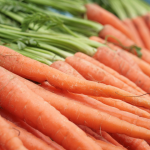
Carrots are a colorful, sweet vegetable to introduce to baby.
Bananas-
Bananas are like avocados because they are ready to eat. Easily mashed and taken with you on the go, this delicious fruit is filled with all the vitamins and nutrients we need and is considered to ‘have it all.’ The sugars and carbohydrates in a banana are easily regulated with fat and protein, both of which your baby will be getting from breast milk, or by adding some coconut oil to the banana. Too many could cause constipation, so always in moderation. You’ll learn what amount is right for your child.
Cooked Spinach-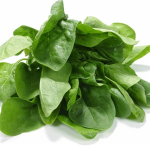
Spinach is great to introduce to your little one between 7-9 months. Spinach is another great source of iron and calcium. Steam or boil it in bone broth and add a healthy fat option. You can blend the cooked spinach or finely dice. Once the children are older I love to make creamed spinach with raw cream and raw milk and add it to quinoa. My kids love it!!!
Whenever possible
→Buy organic, fresh food
→Cook with bone broth or add a healthy fat of either ghee, coconut oil or grass fed butter.
If you are going to choose rice cereal, please choose BROWN RICE cereal or make your own. Soaking the rice for a couple of hours before hand will help break down the rice for much easier digestion since they don’t have the enzymes to break it down. If you already have fed your little one rice cereal, don’t fret. We, as mothers are always doing the best we can. No living in the past! I would have a laundry list of ‘wish I hadn’ts’ as a mother in the last 3-4 years if I lived in the past. So only the present! If you are here reading this, then you are likely interested in real food and holistic health and taking great care of your little one:)
Leave the mush and let your baby lead the way? This is called BABY LED WEANING Learn more about baby led weaning HERE
Thanks for visiting!
References
Nourishing Traditions Book Baby & Child
Weston A Price Foundation
⊗
Always consult with your pediatrician about introducing solid foods to your baby Remember, always consult with your pediatrician regarding introducing solid foods to your baby and specifically discuss any foods that may pose allergy risks for your baby.
